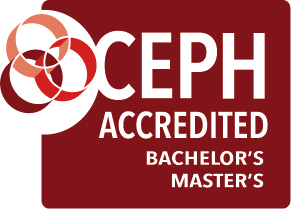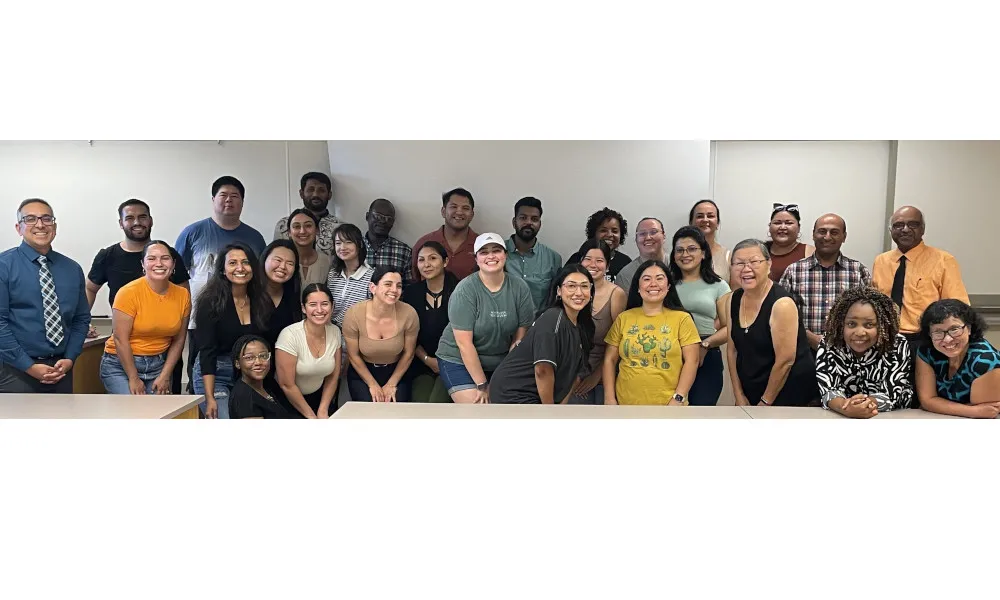Welcome
The Master of Public Health (MPH) degree, accredited by the Council on Education for Public Health (CEPH), is the choice for those seeking to advance to management levels in the design, implementation, and administration of public health programs and organizations. Our MPH individuals to provide service and leadership within communities. This 2-year program is designed for those who wish to expand their skills, knowledge and expertise within the fields of public and community health. The foundation for the curriculum includes the 5 core areas of public health: health status and determinants of health, public health statistics, epidemiology, environmental and occupational health, and health systems organization and delivery.
Program Director: Amber Olney, MPH
Email: AOlney@csusb.edu
Mission
Our mission is to prepare public health professionals to assume leadership roles in population-based settings by identifying gaps in health systems and community resources, and by addressing the social determinants of health. Through this approach, we aim to promote, preserve, and restore the health of local communities, reduce health disparities, and advance health equity.
Vision
Our vision is to serve as a community resource for promoting public health and make a positive impact toward achieving health equity and social justice through health education and promotion programs and services in underserved, diverse communities to address the unique needs of the Inland Empire such as food deserts, mental health issues and homelessness.
Values
Our values serve as a guide in the work we do in the pursuit of excellence in the work of public health. We value:
Diversity
A respect for all people in global and local communities and to appreciate diverse cultures’ perspectives and beliefs, as we promote population health and the reduction of health disparities.
Equity
Fairness and social justice in addressing population health.
Interdisciplinary Collaboration
Using an ecological framework and reasoned debate through collaborative approaches across disciplines to advance scientific knowledge and improve population health
Student Centered Learning
A dynamic learning community that fosters engaged learning where students have a voice in the process of their education including practical opportunities for problem solving.
Advocacy
Actions to achieve equitable access to public health, health resources, and public policies.
Innovation
Innovative approaches to educate and inspire faculty and students in teaching, learning, and addressing public health matters.
Professionalism
Honesty and mutual respect in teaching, learning, and public service as we engage students in activities that advance their skills within the profession as they assume duties and responsibilities in public health.
Scholarship
Engagement by faculty and students in methods that foster comprehension of the extent of current public health information, and the role of research to contribute to future public health evidence and solutions.
Application to the MPH Program
- Students are admitted for the Fall semester.
- The application deadline for the upcoming Fall term is March 31st by 11:59pm PDT
For application information, please visit the Office of Graduate Studies for key University guidelines.
Applicants must first apply to the University through Cal State Apply.
Next, applicants must submit all Departmental requirements. Please contact program Director for all questions related to admissions.
For application information, please visit the Office of Graduate Studies for key University guidelines.
Applicants must first apply to the University through Cal State Apply.
Goals
Our goals are fundamental to the program and in the attainment of our mission.
Instructional Goals
Sustain an environment of academic rigor by ensuring faculty are teaching effectively.
Design, implement, and evaluate a competency and practice-based academically rigorous program to ensure all students are prepared to assume public health related careers.
Research Goals
Foster an environment for faculty exploration of public health research to train and prepare students to conduct ethically-based public health research.
Service Goals
Building capacity to strengthen relationships between the program faculty, students, and public health workforce in the service of others.
Below is what you should always enroll in, as a cohort:
Year 1 Fall
HSCI 6200; HSCI 6240; and HSCI 6250
Year 1 Spring
HSCI 6230; HSCI 6260; HSCI 6410 + Internship if located one [HSCI 6954]
Year 2 Fall
HSCI 6210; HSCI 6220 + Internship if located one [HSCI 6954] + Thesis [6974] or Project [6960]
Year 2 Spring
HSCI 6280; HSCI 6390 + Internship if located one [HSCI 6954] + Thesis [6974] or Project [6960]
Requirements for Graduation
Advancement to candidacy for the degree and approval of the specific program of study;
A cumulative grade point average of 3.0 (“B”) or better, in all graduate course work fulfilling the requirements of the Master of Public Health and grades of “B” (3.0) or better in all coursework;
A minimum of 42 semester units of approved graduate-level coursework included in the formal program, with at least half of the units required for the degree gained from 6000-level courses in Health Science and Human Ecology (HSCI), a minimum of 30 units must be completed at this university;
Completion of all program requirements, including culminating experience;
The Graduate Writing Assessment Requirement is met by completion of a program-specific course in consultation with an advisor.
Degree Requirements (42 units)
(Program Code: PHLT)
Core courses (34)
HSCI 6200 Professional Development and Leadership in Public Health
HSCI 6210 Advanced Biostatistics for Public Health
HSCI 6220 Advanced Topics in Epidemiology
HSCI 6230 Advanced Topics in Environmental and Occupational Health
HSCI 6240 Advanced Study in Health Promotion
HSCI 6250 Advanced Topics in Public Health Policy and Administration
HSCI 6260 Health Education Program Planning and Evaluation
HSCI 6280 Grant Writing for Health Sciences
HSCI 6390 Advanced Professional Development and Leadership in Public Health
HSCI 6410 Project Preparation
Integrated Learning Experience Options (4)
Total Units 42
Integrated Learning Experience
Choose one of the following:
HSCI 6960
Project
HSCI 6974
Thesis
Total Units 4
Applied Practice Experience
Must be Completed by ALL students:
HSCI 6954
Total Units 4
Students complete an integrative learning experience that demonstrates a synthesis of foundational and concentration competencies. In consultation with the program director and faculty, students select specific competencies appropriate for students' educational and professional goals.
A Master of Public Health (MPH) degree opens up a wide range of career opportunities in the field of public health. The MPH degree provides advanced knowledge and skills in areas such as epidemiology, biostatistics, health policy, environmental health, and health promotion. Here are some career paths you can consider with an MPH degree:
- Epidemiologist: MPH graduates can work as epidemiologists who study the patterns and causes of diseases in populations. They collect and analyze health data, investigate outbreaks, and contribute to public health interventions and policies.
- Health Policy Analyst: MPH graduates can work as health policy analysts who assess and analyze public health policies. They evaluate the impact of policies on populations, conduct research, and make recommendations to improve health systems and policies.
- Biostatistician: MPH graduates with a strong quantitative background can work as biostatisticians. They analyze health data, design research studies, and contribute to the interpretation of research findings to inform public health interventions.
- Public Health Program Manager: MPH graduates can work as program managers in public health organizations or government agencies. They oversee the planning, implementation, and evaluation of public health programs, ensuring their effectiveness and efficiency.
- Health Educator: MPH graduates can work as health educators who develop and implement health education programs. They design interventions to promote healthy behaviors, conduct community outreach, and educate individuals and communities on health-related topics.
- Environmental Health Specialist: MPH graduates with a focus on environmental health can work as environmental health specialists. They assess and manage environmental factors that can impact public health, such as air and water quality, occupational health, and hazardous substances.
- Global Health Specialist: MPH graduates can work in global health, addressing health issues at an international level. They may work on projects related to infectious diseases, maternal and child health, health system strengthening, or emergency response in various countries or with international organizations.
- Public Health Researcher: MPH graduates can pursue research careers in public health. They can work in academic institutions, research organizations, or government agencies, conducting research to generate new knowledge and evidence for public health interventions.
- Healthcare Administrator: MPH graduates with a focus on healthcare management can work as administrators in healthcare organizations. They oversee the operations, finances, and policies of healthcare facilities, ensuring the delivery of quality care and effective public health programs.
- Public Health Consultant: MPH graduates can work as consultants, providing expertise and guidance on public health issues. They may work with organizations, governments, or communities to develop strategies, evaluate programs, and provide recommendations for improving public health outcomes.
These are just a few examples of the diverse career opportunities available to MPH graduates. The field of public health offers a wide range of settings, including government agencies, non-profit organizations, research institutions, healthcare facilities, and international organizations. Your specific career path will depend on your interests, skills, and the specialization within public health that you choose to pursue during your MPH program.
Accreditation
The BS Public Health and Master of Public Health programs are accredited by the Council on Education for Public Health (CEPH). The Council on Education for Public Health (CEPH), the accrediting agency for schools and programs in public health, acted on September 5, 2025 to confer probationary accreditation on our unit extending to September 30, 2026.
CEPH guarantees that your degree will be recognized as being from an accredited unit, if you complete all requirements of your degree by September 30, 2026. However, students who anticipate completing the requirements after this date are not guaranteed that their degree with be recognized as being from an accredited unit.
Please be assured that this does not affect our accreditation—we remain fully accredited, and your degree will continue to hold its value. Probation simply means that we have been asked to make improvements in uncertain areas, and we are committed to addressing these promptly and effectively. Our faculty and leadership are working hard to implement positive changes that will strengthen the program and enhance your educational experience. We appreciate your dedication to your studies and encourage you to reach out with any questions or concerns to Prof. Amber Olney at Aolney@csusb.edu.
Parts of our programs’ evaluation process and reporting to our accrediting agency relies on the yearly surveys we send out to students, alumni, and faculty. We take this opportunity to highlight the importance of completing these surveys in a timely manner so that we can both use your feedback to continue to improve the program, as well as meet our accreditation requirements each year. Thank you for taking the time to complete these surveys and continue to give back to our program. For additional information, please contact CEPH at www.CEPH.org.


